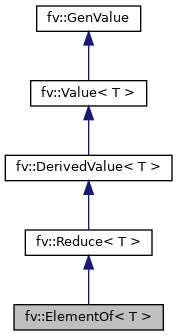Extract the element at a specific index from a vector. More...
#include <value.hpp>
Inheritance diagram for fv::ElementOf< T >:

Collaboration diagram for fv::ElementOf< T >:

Public Member Functions | |
| ElementOf (Value< int > *index, const std::string &v_name, const std::string alias="") | |
| ElementOf (const std::string &name, int index, const std::string &v_name, const std::string alias="") | |
 Public Member Functions inherited from fv::Reduce< T > Public Member Functions inherited from fv::Reduce< T > | |
| Reduce (Function< T(std::vector< T >)> &reduce, Value< std::vector< T > > *v, const std::string alias="") | |
| Reduce (Function< T(std::vector< T >)> &reduce, const std::string &v_name, const std::string alias="") | |
 Public Member Functions inherited from fv::DerivedValue< T > Public Member Functions inherited from fv::DerivedValue< T > | |
| DerivedValue (const std::string &name, const std::string &alias="") | |
| T & | get_value () |
| Calculate, if necessary, and return the value held by this object. | |
 Public Member Functions inherited from fv::Value< T > Public Member Functions inherited from fv::Value< T > | |
| Value (const std::string &name, const std::string &alias="") | |
 Public Member Functions inherited from fv::GenValue Public Member Functions inherited from fv::GenValue | |
| GenValue (const std::string &name, const std::string &alias) | |
| const std::string & | get_name () |
Private Member Functions | |
| void | verify_integrity () |
| This function serves to check that this Value has been created with real, i.e. More... | |
Additional Inherited Members | |
 Static Public Member Functions inherited from fv::GenValue Static Public Member Functions inherited from fv::GenValue | |
| static void | reset () |
| static GenValue * | get_value (const std::string &name) |
| static void | alias (const std::string &name, GenValue *value) |
| static GenValue * | alias (const std::string &name) |
| static std::string | summary () |
 Protected Attributes inherited from fv::Reduce< T > Protected Attributes inherited from fv::Reduce< T > | |
| Value< std::vector< T > > * | v |
 Protected Attributes inherited from fv::DerivedValue< T > Protected Attributes inherited from fv::DerivedValue< T > | |
| T | value |
| bool | value_valid |
 Static Protected Attributes inherited from fv::GenValue Static Protected Attributes inherited from fv::GenValue | |
| static std::map< const std::string, GenValue * > | values |
| A static mapping containing all created Value objects. More... | |
| static std::map< const std::string, GenValue * > | aliases |
| Composite value names are typically nested. More... | |
Detailed Description
template<typename T>
class fv::ElementOf< T >
Extract the element at a specific index from a vector.
Member Function Documentation
§ verify_integrity()
template<typename T >
|
inlineprivatevirtual |
This function serves to check that this Value has been created with real, i.e.
non null, arguments. This is to avoid segfaulting when a dynamic_cast fails. If no checks need to be made, simple override this method with a no-op. If checks fail, the function should utilize the CRITICAL macro with a meaningfull error message stating what failed and especially the name of the current value.
Reimplemented from fv::Reduce< T >.
The documentation for this class was generated from the following file:
- /home/caleb/Sources/TTTT/filval/value.hpp
 1.8.12
1.8.12